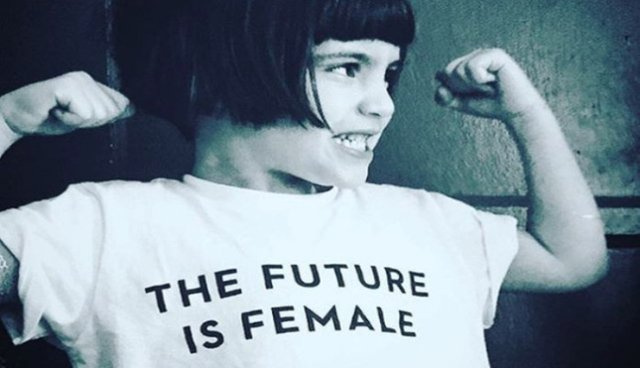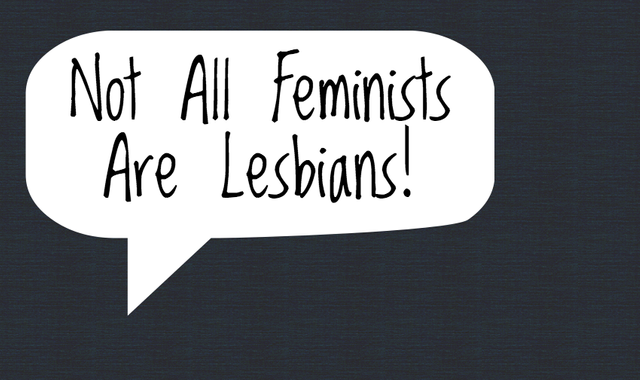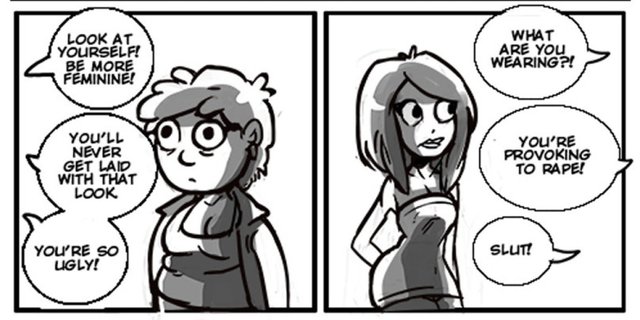A Quick Guide to Anti-Feminist Stereotypes
One of the first experiences most young feminists have – especially online – is coming face-to-face with deeply entrenched anti-feminist sentiments.
These beliefs are so common as to go almost without comment, but their use reveals a number of sexist, racist, homophobic and other oppressive biases that are weaponized against women in order to maintain existing power structures.
Far from demonstrating that there's anything wrong with an individual feminist, these anti-feminist stereotypes show the need for feminists to continue to break down harmful beliefs about women.
Anti-Feminist Stereotypes
The exact same anti-feminist stereotypes we see today were also around a century ago. Anti-suffragist sentiments relied on identical sexist attitudes to the ones that are regularly used now. Some of the main anti-feminist stereotypes that we see today are:
- Feminists are ugly in some way
- Feminists are angry man-haters
- Feminists are lesbians
- Feminists need to get laid
- Feminists are sluts (and men are here to pass judgment on them for it)
Often, in fact, the stereotype doesn't even apply to the person being attacked – but using it allows an anti-feminist to avoid addressing the content of what a feminist said.
By dismissing feminists using anti-feminist stereotypes, arguments are derailed and actual points go unanswered.
Feminists are Ugly
In a sexist society, ideal standards of beauty are used as both carrot and stick. Women who meet or attempt to meet those standards are rewarded in limited ways. Women who don't are punished. Age and race are also key factors in how beauty standards are used to keep women in line – when the pinnacle of beauty is a young, thin, white, cisgender, straight woman, anyone who fails to meet one or more of those categories will be excluded from "beauty" and the benefits it offers.
However, being ugly is also presumed to be a deliberate offense, and women who aren't striving to meet externally applied standards of appearance are often dismissed on that basis alone.
Feminists will be called ugly regardless of what they actually look like, with ageist and racist comments often included in that attack. Anti-feminists typically put a lot of stock in beauty standards: society tells men in particular that their opinion on a woman's beauty is directly related to whether she is worthy of attention, safety, and just treatment.
Calling a feminist ugly is not only an attempt to put her on the defensive (and therefore "prove" that feminists actually care about appealing to men but just can't get one); it's also a way to tell her that she, by not being attractive to an individual man, is worthless.
The problem with this line of reasoning should be obvious, but often isn't to the anti-feminist relying on the "ugly" stereotype. While many feminists care about feeling beautiful, feminism has allowed for the creation of a much more inclusive idea of beauty than anti-feminists care to understand, and feminists acknowledge that a person's appearance is not intrinsic to their value or whether they have something worth saying.
Calling a feminist ugly is only an effective insult for the person who believes that their opinion is meaningful to anyone else.
Feminists are Angry Man-Haters
One of the key stereotypes in any anti-feminist's arsenal is that feminists are just angry women who hate men for no good reason, and therefore can be considered irrational and safely ignored. This argument conveniently sidesteps any of the topics feminists are bringing up by telling feminists that we're simply angry over nothing.
Women's anger has historically been used as a silencing tactic – women are expected to be demure, accommodating, and quiet. Thanks to this expectation, a woman who is not has violated her expected role as a woman and is therefore seen as incorrect on that basis.
The accusation of man-hating is as old as patriarchy itself. Sexism is structured so that women's role is to support the existing status quo and expend their energy on men and men's desires. A woman who resists this in any way – whether it's active feminist campaigning or simply refusing to perform emotional labor for free – will immediately be accused of hating men. "Hatred" in this context is nothing more than a woman shifting her priorities in ways that are more just for her and her life.
To an anti-feminist man, this shift is not a move towards equality, but a change in his privilege that means something he felt entitled to was taken away. Accusing a woman of man-hating behaviors is an attempt to reinforce his power and shame feminists into assuming their expected role.
Accusations of anger and man-hating both rely on stereotypes about women that have been used to maintain inequality and injustice: Women are positioned as inherently irrational people whose ideal role is to serve men.
Feminism challenges those beliefs at their core, and so it is not surprising to see these beliefs repeated as an attempt to reinforce them. These stereotypes give anti-feminists a way to reject anything a feminist says without consideration, but they also reveal what the person using them thinks of women.
Feminists are Lesbians
The belief that feminists are lesbians reveals an anti-feminist's fears and insecurities about women and women's autonomy. Being a lesbian and being a man-hater are often used synonymously, because anti-feminists see women as objects for their pleasure.
A lesbian challenges that belief by existing: she cannot be presumed to be a sexual object for a man's control, and since so much sexist power relies on sexual power and control, a lesbian is a threat. At the same time, those who insist that value is connected to sexuality can call women valueless by assuming they are not interested in men.
Anti-feminists who call feminists lesbians are attempting to reinforce the idea that women should be heterosexual and sexually available to men. By making the value of a feminist's argument contingent on who she has sex with, the anti-feminist creates an opportunity to reject both her statement and her as a person without engaging in a serious conversation.
If a woman is supposed to prioritize the opinions and pleasure of men, a woman who doesn't do this (whether or not she is actually a lesbian) is positioned as worthless.
A man who values women only insofar as they are sexually available to him demonstrates the need for serious feminist work, and the ongoing need to dismantle homophobia. However, calling a feminist a lesbian as a way to dismiss her argument is not the only aspect of sex and sexuality that anti-feminists use as an attack.
Feminists Need to Get Laid
The "feminists can't get a man" stereotype has also morphed into the belief that feminists never have any sex, and that if they had sex with a cisgender straight man, they would be "cured" of their feminist beliefs. The idea that feminism arises from an inability to find a sexual partner reveals deep insecurities on the part of the person making that argument, but says nothing about the actual sexual proclivities or habits of the feminist being targeted.
Portraying feminists as frigid, bitter, and sexless women who would be turned into docile Stepford wives post coitus shows nothing more than an anti-feminist's beliefs about women's proper role in society. The idea that having sex with a man is a life-changing experience for a woman reflects the overblown importance many cisgender straight men attach to their own sexual prowess – which is a symbol of toxic masculinity and deeply connected to the idea of corrective rape.
Sexual activity does not enable a man to control a woman, but many men believe that it does; feminism challenges that belief in ways that make anti-feminist men deeply insecure about their role in society.
Telling a feminist she needs to get laid is an attempt to claim a form of power over her and remind her of her "place" in the anti-feminist's ideal society: doing what she's told by a man. Regardless of how much sex an individual feminist is having or not having, the point is to reinforce sexist power structures of gender and sexuality.
Feminists are Sluts
The other side of the sex coin for anti-feminists is that feminists have too much sex and must be stopped. These positions may seem contradictory, and they are – on the face of it. The beliefs that underpin each argument, however, are the same.
A feminist who is painted as frigid needs to be told by a man to have sex; a feminist who is painted as a slut needs to be told by a man to have less sex. Either way, women's bodies are reframed as objects to be controlled by others.
The fear of sexually liberated women is the same fear applied to sexually unavailable women. A woman who is not under the authority of a man has mobility, autonomy, and some level of power. In a sexist society, women's power is a thing to be feared and destroyed.
Attempting to curtail women's freedom by attacking them sexually is an ancient strategy. "Good" women have access to protection in the existing power structures, but "goodness" is applied and withdrawn at the whim of an external authority.
Feminists who reject the constraints placed on sex and sexuality will be told that their behavior is shameful. Shaming women is an attempt to reinforce existing power structures and ensure that women are afraid to claim their sex lives in ways that are authentic and free.
Women who refuse to meet the expected behavioral limitations men wish to enforce represent a challenge to that power. For the anti-feminist, reducing anything a feminist says or does to whether she's having too much sex or not enough is an easy way to shut down a conversation about power structures.
Power and Control
These anti-feminist stereotypes show many of the beliefs that anti-feminists hold about men, women, power and control. Men are presumed to be and want to feel inherently more powerful than women, and women are expected to be sexually and socially subservient.
Women who break out of those limiting formulations are a visible challenge to those ideals, and as a result, those standards are used as an attack. Most forms of social shaming and censure are an attempt to reinforce expectations of behavior and existence – anti-feminist stereotypes are no different.
The goal of these anti-feminist insults is not to demonstrate anything real or true about the feminist being targeted. Instead, they are a reminder that a woman has stepped outside her expected social position, and a way to try to force her back into it.
Each stereotype represents the underlying fear of a loss of control over women. As with most insults based on stereotype, their use tells us much more about the person using them than the person they are attacking.







Congratulation! You got an upvote from me.
I give free upvotes to all quality posts under the tag “feminism”. You can tag me in the post if I forget or send me a reminder. I will not upvote if the post is not relevant and wrongly tagged under “feminism”.
You can consider joining our Facebook group - https://www.facebook.com/groups/societyofpowerfulwomen
This post was shared in the Curation Collective Discord community for curators, and upvoted and resteemed by the @c-squared community account after manual review.